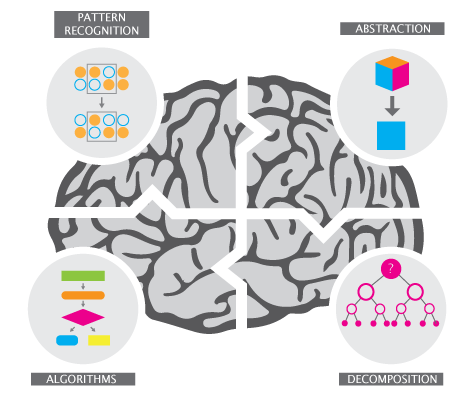
For Parents
What is computational thinking?
Computational thinking is the thought processes involved in formulating a problem and expressing its solution(s) in such a way
that a computer—human or machine—can effectively carry out.
~Jeanette Wing, “Computational Thinking Benefits Society”, http://socialissues.cs.toronto.edu/. Jan, 2014.
Google for Education describes CT as: a problem solving process that includes a number of characteristics, such as logically ordering and analyzing data and creating solutions using a series of ordered steps (or algorithms), and dispositions, such as the ability to confidently deal with complexity and open-ended problems. CT is essential to the development of computer applications, but it can also be used to support problem solving across all disciplines, including math, science, and the humanities. Students who learn CT across the curriculum can begin to see a relationship between subjects as well as between school and life outside of the classroom.

A common criticism of mainstream education is that we sit kids in desks and fill them with knowledge rather than encourage them to acquire critical thinking skills through active experiences. The Evolution in Action! workshop offers kids a fun way to explore concepts related to computational thinking by participating in open-ended, group exercises that integrate concepts from game theory and evolution. Evolution in Action! exercises administer simple but profound ways for kids to think about the procedural aspects of processes and systems they see in the world. We believe there's a lot of computation going on in the world and our goal is to develop with each child an implicit awareness of this in subtle, kid-friendly ways.
Best of all, attending the workshop is absolutely free for you and your kids!
Evolution in Action! workshop exercises are a great example of how computer science and computational thinking can be introduced and integrated with different facets of learning. To promote success in the modern world, we must foster innovation, invention, and problem solving. To do this our kids need to learn to think in a computational way, acquiring the ability to tackle open ended problems which are so common in the world. We must empower our kids to think boldly, to think outside the box, and to think beyond expectations.
Want to bring Evolution in Action! to your school or group? Contact us for details at evoinact@mit.edu!
Learn more about computational thinking!
Grover, Shuchi, and Roy Pea. "Computational Thinking in K–12 A Review of the State of the Field." Educational Researcher 42.1 (2013): 38-43.
Bers, Marina U. "The TangibleK Robotics Program: Applied Computational Thinking for Young Children." Early Childhood Research & Practice 12.2 (2010): n2.
Wing, Jeannette M. "Computational thinking and thinking about computing." Philosophical Transactions of the Royal Society of London A: Mathematical, Physical and Engineering Sciences 366.1881 (2008): 3717-3725.
Guzdial, Mark. "Education Paving the way for computational thinking." Communications of the ACM 51.8 (2008): 25-27.






